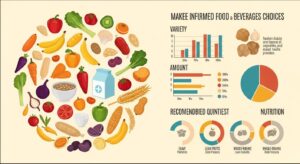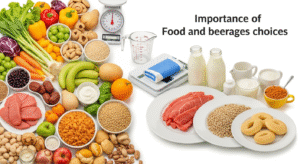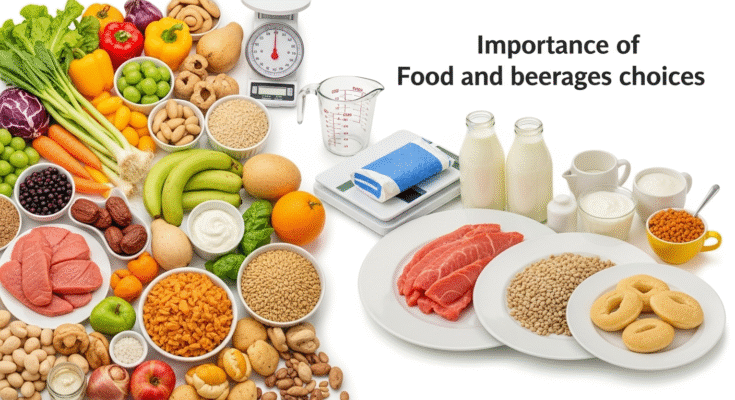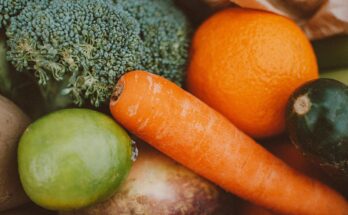The Power on Your Plate: A Detailed Look at the Health Benefits of Fruits and Vegetables
A diet rich in fruits and vegetables is a cornerstone of a healthy lifestyle, offering a powerful array of benefits that extend far beyond basic nutrition. The simple act of incorporating a variety of these natural powerhouses into your daily meals can significantly lower your risk for chronic diseases, aid in weight management, and provide essential nutrients often lacking in the modern diet. Let’s delve into the detailed health benefits of making fruits and vegetables a focal point of your food and beverage choices.
Lowering Calorie Intake for Healthy Weight Management
One of the most immediate and impactful benefits of a diet rich in fruits is its effect on overall calorie consumption. Fruits are naturally lower in calories per cup compared to many other food groups, particularly those high in processed sugars and unhealthy fats. This is largely due to their high water and fiber content, which provides volume and a sense of fullness without a dense caloric load.
By substituting high-calorie snacks and desserts with fresh fruit, you can satisfy your sweet cravings while significantly reducing your daily calorie intake. This simple swap can be a key strategy in achieving and maintaining a healthy weight, which in turn reduces the risk of a multitude of obesity-related health issues.
A Shield for Your Heart: Reducing the Risk of Heart Disease, Heart Attack, and Stroke
A robust body of scientific evidence consistently links a diet abundant in fruits and vegetables to a lower risk of cardiovascular diseases. The protective effects are multifaceted:
- Lowering Blood Pressure: Many fruits and vegetables are excellent sources of potassium, a mineral that plays a vital role in regulating blood pressure. Potassium helps to counterbalance the effects of sodium, a common contributor to hypertension.
- Improving Cholesterol Levels: The soluble fiber found in fruits like apples, citrus, and berries can help lower LDL (“bad”) cholesterol levels. This type of fiber binds with cholesterol in the digestive system, preventing its absorption into the bloodstream.
- Rich in Antioxidants: Fruits and vegetables are packed with antioxidants, such as vitamins C and E, beta-carotene, and various polyphenols. These compounds help to combat oxidative stress and inflammation, which are key drivers in the development of atherosclerosis (the hardening and narrowing of the arteries).
- Enhancing Blood Vessel Function: Certain nutrients and compounds in fruits and vegetables can improve the function of the endothelium, the inner lining of blood vessels, promoting better blood flow and reducing the risk of clot formation.
Studies have shown that regular consumption of a variety of fruits and vegetables can lead to a significant reduction in the incidence of both heart attacks and strokes.

A Formidable Defense Against Cancer
While no single food can prevent cancer, a diet rich in fruits and vegetables is a powerful tool in reducing the risk of developing certain types of cancers. The protective mechanisms are believed to be a result of several factors:
- Antioxidant Power: The antioxidants found in these foods help to neutralize free radicals, unstable molecules that can damage DNA and lead to cancerous mutations.
- Phytochemicals: Fruits and vegetables contain thousands of natural plant compounds called phytochemicals. Many of these, such as flavonoids and carotenoids, have demonstrated anti-cancer properties in laboratory studies, including the ability to inhibit tumor growth and induce cancer cell death.
- Fiber’s Role: A high-fiber diet, promoted by significant fruit and vegetable intake, is particularly associated with a lower risk of colorectal cancer. Fiber helps to move waste through the digestive system more quickly, reducing the contact time of potential carcinogens with the intestinal lining.
Research has specifically pointed to the protective effects of fruits and vegetables against cancers of the mouth, throat, esophagus, stomach, and lungs.

Boosting Essential Nutrients: Fiber and Potassium
Beyond their disease-fighting properties, fruits are crucial for providing two essential nutrients that are often under-consumed in the average diet: fiber and potassium.
- Dietary Fiber: As mentioned, fiber is essential for digestive health, preventing constipation and promoting a healthy gut microbiome. It also plays a significant role in weight management by increasing feelings of fullness and in blood sugar control by slowing the absorption of sugar.
- Potassium: This vital mineral is crucial for maintaining proper fluid balance, nerve function, and muscle contractions, including the steady rhythm of your heart. Adequate potassium intake is directly linked to lower blood pressure and a reduced risk of stroke.
By consciously adding a variety of fruits to your daily meals and snacks, you can easily increase your intake of these vital nutrients and reap their widespread health benefits.
In conclusion, the message is clear: every food and beverage choice matters. By focusing on the variety, amount, and nutritional powerhouse that fruits and vegetables represent, you are making a profound investment in your long-term health and well-being. From protecting your heart and reducing your cancer risk to managing your weight and ensuring you get enough essential nutrients, the benefits of a diet rich in these natural wonders are undeniable.



